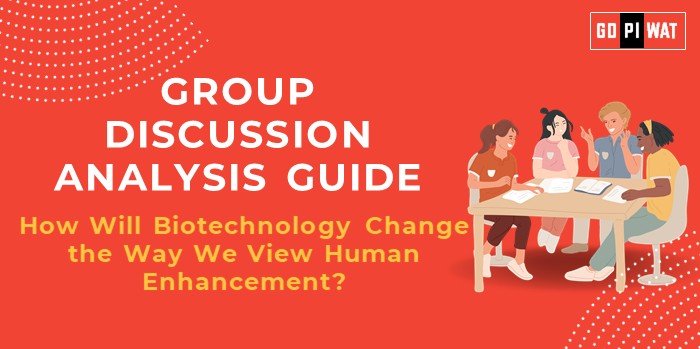📋 Group Discussion (GD) Analysis Guide
🧬 Topic: How Will Biotechnology Change the Way We View Human Enhancement?
🌐 Introduction
Opening Context: Biotechnology, combined with advancements in artificial intelligence, nanotechnology, and robotics, is revolutionizing human enhancement. These innovations offer transformative solutions in healthcare, genetic editing, and wearable technology, paving the way for a future of augmented human capabilities.
Topic Background: Human enhancement technologies are becoming mainstream, driven by innovations such as CRISPR, nanobots, and biohacking tools. The integration of these technologies into healthcare and personal development raises ethical, societal, and economic questions. The market’s rapid growth underscores its importance in shaping the future of humanity.
📊 Quick Facts and Key Statistics
- 🌍 Market Growth: The global human enhancement technology market is expanding rapidly due to advancements in biotechnology, nanotechnology, robotics, and AI.
- 🧬 CRISPR Innovations: The CRISPR and Cas genes market reached $4.69 billion in 2024, with a CAGR of 16.12% projected from 2025 to 2030.
- 💡 Biohacking Boom: Valued at $20.94 billion in 2023, the biohacking market is expected to grow at a CAGR of 18.6% from 2024 to 2030.
- ⏳ Life Expectancy Impact: Gene-editing advancements like CRISPR hold the potential to prevent or cure genetic diseases, significantly improving life expectancy and quality of life.
🤝 Stakeholders and Their Roles
- 🏛️ Government Agencies: Funding research, setting ethical guidelines, and ensuring regulatory compliance.
- 🏢 Private Companies: Innovating in biotechnology tools, wearable devices, and gene-editing technologies.
- 🎓 Academia and Researchers: Advancing the science behind human enhancement.
- 🌍 Global Organizations: WHO and UNESCO are shaping international ethical frameworks.
- 👥 Citizens: Engaging in public discussions and adopting enhancement technologies.
🏆 Achievements and Challenges
- Achievements:
- ✅ Gene Editing Milestones: CRISPR is being used in clinical trials to cure genetic diseases like sickle cell anemia.
- 💻 Biohacking Tools: Widespread adoption of health trackers, genetic testing kits, and wearable tech.
- 🩺 Healthcare Transformation: Enhanced prosthetics and AI-driven diagnostics improve quality of life.
- Challenges:
- ⚖️ Ethical Dilemmas: Concerns over “designer babies” and societal inequality.
- 📜 Regulatory Hurdles: A lack of cohesive international biotech regulations.
- 💸 Economic Inequality: High costs limit access to cutting-edge technologies for many populations.
🌍 Global Comparisons
- 🇨🇳 China: Leading in gene-editing clinical trials, with minimal regulatory barriers.
- 🇪🇺 EU: Emphasizes stringent ethical standards but faces slower adoption of technologies.
Case Study: CRISPR therapy for genetic conditions like beta-thalassemia demonstrates the potential of gene editing while highlighting ethical and regulatory concerns.
🧠 Effective Discussion Approaches
- Opening Approaches:
- 📈 Market Impact: “With biotechnology driving a trillion-dollar industry, how should society balance innovation with ethical considerations?”
- ⚖️ Ethical Perspective: “Can biotechnology democratize human enhancement, or will it deepen social inequalities?”
- 🌟 Visionary Angle: “Biotechnology’s promise to eliminate genetic diseases could redefine healthcare and humanity.”
- Counter-Argument Handling:
- Discuss ethical failures (e.g., eugenics) to frame the need for cautious implementation.
- Present CRISPR trials as evidence of transformative success balanced with regulatory vigilance.
🔍 Strategic Analysis of Strengths and Weaknesses
- Strengths: Breakthroughs in genetic editing, rapid market growth, personalized healthcare innovations.
- Weaknesses: High costs, ethical dilemmas, uneven access to technologies.
- Opportunities: Global leadership in biotech, public-private partnerships, innovations in wearable technology.
- Threats: Potential misuse, cyber threats, lack of global regulatory frameworks.
📄 Structured Arguments for Discussion
- ✅ Supporting Stance: “Biotechnology enhances quality of life, enabling solutions to previously untreatable conditions.”
- ❌ Opposing Stance: “Ethical risks and economic inequalities could outweigh the benefits of widespread human enhancement.”
- ⚖️ Balanced Perspective: “Human enhancement offers immense potential, but its benefits hinge on ethical regulation and equitable access.”
📚 Connecting with B-School Applications
- 💼 Real-World Applications: Explore biotech’s role in operations, healthcare policy, and innovation management.
- 📝 Sample Questions:
- “What role should ethical guidelines play in the development of human enhancement technologies?”
- “How can biotechnology companies ensure equitable access to life-changing innovations?”
- 💡 Insights for Students: Develop strategies for managing innovation within regulatory frameworks or assess biotech’s market potential for investment projects.


